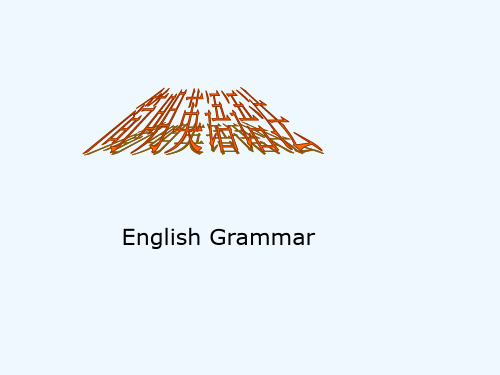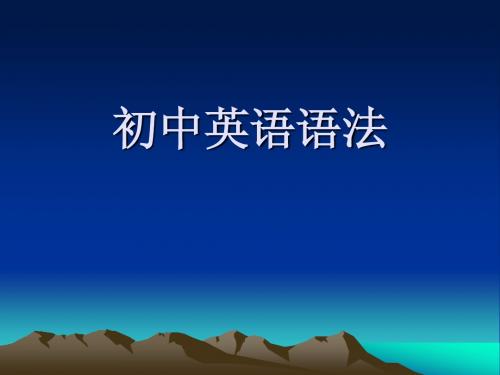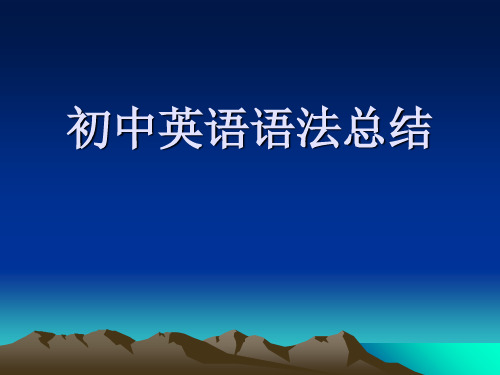初中英语语法讲解课件
合集下载
初中英语语法讲解课件

名词复数的不规则变化
1)child---children foot---feet
tooth---teeth
mouse---mice
man---men
woman---women
注意:与 man 和 woman构成的合成
词,其复数形式也是 -men 和-women。
如: an Englishman,two
1.2名词复数的规则变化(P5)
____________________________
_______________________
情况 构成方法 读音
例词
____________________________
______________________
一般情况
加 -s 1.清辅音后读
/s/; map-maps
蛋糕是一种食物。 (不可数) These cakes are sweet.
这些蛋糕很好吃。 (可数) b. 当物质名词表示该物质的种类时,
名词可数。 This factory produces steel.
(不可数) We need various steels. (可数)
c. 当物质名词表示份数时,可数。
2) man, woman, gentleman等作定 语时,其单复数以所修饰的名词的单复数
3) 有些原有s结尾的名词,作定语时,s保留。 如:goods train (货车) arms produce 武器生产 customs papers 海关文件 clothes brush衣刷
4) 数词+名词作定语时,这个名词一般保留单数形式。 如:two-dozen eggs 两打/(二十四个鸡蛋) a ten-mile walk 十里路 two-hundred trees 两百棵树 a five-year plan 一个五年计划
初中英语零基础学语法--英语句子结构 课件(共43张PPT)

附属成分
基本成分的修饰语。可以是: • 定语:即用来修饰名词的单词、短语或从句 • 状语:即用来修饰名词或代词以外的词的单词、短语或从句。
定语
Poor John tottered toward a hospital nearby. She likes oranges imported from the USA.
省略成分
句中被省略的成分,虽然未说出来,却在句中表示 一定的意思:
(You) Come here. (I wish you)Good luck! Some gave him praises,but others(gave him)rotten eggs.
He runs as fast as, if ( he does ) not ( run ) faster, than you. ( I ) Hope you like it. John should clean the room today and Peter ( should clean it ) tomorrow.
主语、动词(不及物动词、及物动词、双宾动词、系动词、宾 补动词)、宾语及补语可以称为基本句子成分。完整的句子一 般至少包含2个基本成分,至多4个基本成分。
Vi(不及物动词)
主 语
谓 语
Vt(及物动词)
宾语 宾语(直) 宾语(间) 宾语 宾补
系动词
表语
be / feel / seem / look appear / stand / lie become /get / grow / turn go / come / remain/ keep taste / smell etc.
连接成分
连接成分实际上是一个连词,用来连接两个或几个平行的词、
初中英语语法课件ppt

vacation together.
过去将来时的使用:
一、过去将来时表示对于过去某一时间而言将要发生的动 作或存在的状态。 would或was /were going to + V
would可用于各种人称。
二、would +V还可表示过去的习惯动作,在这点上同used to同义。
When we were children, we would/used to go swimming every summer.
e) 用于条件从句“如果……想,设想”(接近if ……want to,或 if ……should) 例:Greater efforts to increase agricultural production must be made if food shortage ____________ avoided. A) is to be B) can be C) will be D) has been
一般现在时的动词形式: 动词原形 1.am;is ;are 2.have,has 3.第三人称单数形式-(e)s
肯定句:I watch television every day.
否定句:I don’t watch television every day.
疑问句:Do you watch television every day.
一般现在时的使用:
1.一般现在时表示总是、通常、习惯 性的动作或状态。
It snows in winter. I watch television every day.
2.用于对客观事实的普遍性的陈述。
Water consists of hydrogen and oxygen. Most animals kill only for food. The world is round.
过去将来时的使用:
一、过去将来时表示对于过去某一时间而言将要发生的动 作或存在的状态。 would或was /were going to + V
would可用于各种人称。
二、would +V还可表示过去的习惯动作,在这点上同used to同义。
When we were children, we would/used to go swimming every summer.
e) 用于条件从句“如果……想,设想”(接近if ……want to,或 if ……should) 例:Greater efforts to increase agricultural production must be made if food shortage ____________ avoided. A) is to be B) can be C) will be D) has been
一般现在时的动词形式: 动词原形 1.am;is ;are 2.have,has 3.第三人称单数形式-(e)s
肯定句:I watch television every day.
否定句:I don’t watch television every day.
疑问句:Do you watch television every day.
一般现在时的使用:
1.一般现在时表示总是、通常、习惯 性的动作或状态。
It snows in winter. I watch television every day.
2.用于对客观事实的普遍性的陈述。
Water consists of hydrogen and oxygen. Most animals kill only for food. The world is round.
初中英语语法PPT课件

第四章 限定词
• 限定词分前中后,倍数分数是 前位,冠词算是中位词,还有指代 和物代;基数序数相关词,都作后 位限定词。前位中位只一个,后位 可以有多个。
• 三类限定词的搭配顺序为: • 前位——中位——后位。
冠词(Article)
• • • • • • • • 1)定冠词的用法。 特指都熟悉,上文已提及; 世上独无二,序数最高级; 普通变成专用名,方位only弹乐器。 零冠词的用法。 专有名词不可数,学科球类三餐饭; 复数名词表泛指,节日星期月份前; 颜色语种和重复,称呼习语加头衔。
第五章 代词
• • • • • • • • 注意事项 (1)当人称代词在分裂句中作中心成分时,常用作主格。 It is he who did it. 但在非正式语体中也可用宾格。 It is me that did it. (2)当句子主语为“everybody/nobody+but/except+人称代词”的 结构时,只要出现在主语位置常用主格。 Nobody but she can solve our problem.只有她能解决我们的问题。 Everybody except he agreed to the idea.除他之外每个人都同意这个 主意。 但若主语被分隔而此短语出现在句尾时,则用宾格。 Nobody but she can solve our problem but her. Everybody except he agreed to the idea except him. 用作句子宾语时,只能用宾格。 I interviewed everybody but him.除他之外我请了每个人。
• • • •
• • •
•
巧记单数变复数时不同形的名词: 男女脚步牙鹅,老鼠孩子加虱婆。 man-men woman-women foot-feet tooth-teeth; goose-geese mouse-mice louse-lice childchildren 同形的有: 中日人民爱护羊,鹿鱼单复都一样。 sheep-sheep deer-deer fish-fish JapaneseJapanese Chinese-Chinese
初中英语语法大全ppt详解.

If 非真实条件句(1)
If 从句动词
主句动词
与现在事实相反 一般过去时 (did / were)
情态动词 + do
与过去事实相反 过去完成时 情态动词+have done
(had done)
一般过去时
与将来事实相反 (did / were)
would + do
were + to do
should + do
5 虚拟语气 1
2
1
4 9.85
6 强调句和倒 1
0
1
2 5.34
装句
7 主谓一致和 1
1
0 2 5.34
反义疑问句
题型
时独从倒主分虚 态立句装谓词拟 结主结结一结语 构格构构致构气
虚拟语气
虚拟语气用来表示说话人的主观愿望或假 想,所说的是一个条件,不一定是事实, 或与事实相反。
返回
(优选)初中英语语 法大全课件
选择题
选择题共有10道 占总分的5% 内容主要考察语法
返回
序 语法类别 号
1 非谓语动词
200912
3
2010-6 2010- 合计 比例 12
7
4
14 18.5
2 定语从句 1
3
2
6 11.74
3 状语从句 3
2
3
8 12.57
4 名词性从句 2
1
1
4 9.85
宾语从句
I would rather you did it now.
I would rather you came here tomorrow.
I would rather you had come here yesterday.
初中英语语法PPT精品课件

day .
• 练习题:
• 1. Li Ming said he _____happy if Brian_____to China ne xt month.
• A. as; come B. was; would come C. would be; came D.
will be; come
• 2. Jenny said she _____her holiday in China.
• 例句: • Are you going to read ? • He is coming tomorrow .
• 练习题:
• 1. There __________ a meeting tomorrow after noon. A. will be going to B. will going to be C. is going to be D. will go to be
• 2. Charlie ________ here next month.
• A. isn't working B. doesn't working C. isn't g oing to working D. won't work
• 3. He ________ very busy this week, he _____ ___ free next week.
• A. will be; is B. is; isБайду номын сангаасC. will be; will be D. is; will be
现在完成时
• 构成: • have / has +PP • have/has been+doing
• 用法: • 发生在过去影响在现在的动作或状态等
• 练习题:
• 1. Li Ming said he _____happy if Brian_____to China ne xt month.
• A. as; come B. was; would come C. would be; came D.
will be; come
• 2. Jenny said she _____her holiday in China.
• 例句: • Are you going to read ? • He is coming tomorrow .
• 练习题:
• 1. There __________ a meeting tomorrow after noon. A. will be going to B. will going to be C. is going to be D. will go to be
• 2. Charlie ________ here next month.
• A. isn't working B. doesn't working C. isn't g oing to working D. won't work
• 3. He ________ very busy this week, he _____ ___ free next week.
• A. will be; is B. is; isБайду номын сангаасC. will be; will be D. is; will be
现在完成时
• 构成: • have / has +PP • have/has been+doing
• 用法: • 发生在过去影响在现在的动作或状态等
初中英语语法大全精品PPT课件

多时,谓语用复数。 如:There is a sheep in the yard.(院子里有只绵羊)
There are some sheep in the yard.(院子里有一些绵羊) 4、maths, news等虽然有s结尾,但不是复数,因此谓语仍用单数: 如:The news is very exciting. (这个消息令人兴奋)
[注解]:
① ‘s还可以表示某人的家或者某个店铺, 如:my aunt’s(我阿姨家), the doctor’s(诊所)
② 两人共有某物时,可以采用 A and B’s 的形 如:Lucy and Lily’s bedroom(露西和丽丽合住的卧室)
Lucy’s and Lily’s bedroom(露西和丽丽分别的卧室)
如果表示整体概念,则谓语用单数形式, 如:Class Three is a very good class.(三班是好班) 如果表示其中的所有成员时,则谓语用复数形式, 如:Class Three have a map of China.(三班有张中国地图) 3、Chinese, Japanese, fish, sheep, people等表示单个时谓语用单数,表示许
如: box, child, orange;
不可数名词{u} 是不可以用简单的数词进行计数的名词。
如:water, news, oil, population, information .
英语可数名词的单复数
1、名词由单数变复数的基本方法如下: ①在单数名词词尾加s。 如:map → maps,boy→ boys,horse→ horses, table→ tables. ②s,o,x ,sh,ch结尾的词加es. 如:class→classes, box→boxes, hero→heroes, dish→dishes,
There are some sheep in the yard.(院子里有一些绵羊) 4、maths, news等虽然有s结尾,但不是复数,因此谓语仍用单数: 如:The news is very exciting. (这个消息令人兴奋)
[注解]:
① ‘s还可以表示某人的家或者某个店铺, 如:my aunt’s(我阿姨家), the doctor’s(诊所)
② 两人共有某物时,可以采用 A and B’s 的形 如:Lucy and Lily’s bedroom(露西和丽丽合住的卧室)
Lucy’s and Lily’s bedroom(露西和丽丽分别的卧室)
如果表示整体概念,则谓语用单数形式, 如:Class Three is a very good class.(三班是好班) 如果表示其中的所有成员时,则谓语用复数形式, 如:Class Three have a map of China.(三班有张中国地图) 3、Chinese, Japanese, fish, sheep, people等表示单个时谓语用单数,表示许
如: box, child, orange;
不可数名词{u} 是不可以用简单的数词进行计数的名词。
如:water, news, oil, population, information .
英语可数名词的单复数
1、名词由单数变复数的基本方法如下: ①在单数名词词尾加s。 如:map → maps,boy→ boys,horse→ horses, table→ tables. ②s,o,x ,sh,ch结尾的词加es. 如:class→classes, box→boxes, hero→heroes, dish→dishes,
初中英语语法专题课件完整版(共983张PPT)

2.不规则变化
构成方法
例词
形式不变 (单复数同形)
sheep-sheep deer-deer Chinese-Chinese Japanese-Japanese
变内部元音字母
foot-feet tooth-teeth goose-geese man-men mouse-mice
词尾加-en/-ren
a group of 一队,一组,一群
②还可用much,little,a little of,a large amount/deal of, no,plenty of等来修饰不可数名词,some,any既可修饰可数名词也可修 饰不可数名词。
much money,plenty of water a little of air some(肯定句): some milk ,some apples any(疑/否):Are there any stamps?I don’t have any money (5)数词-名词-形容词构成的复合形容词,中间的名词不能用
普通名词又可分为下面四类:
1)个体名词:表示单个人或单个事物。 如:gun、kid 、book。 2)集体名词:表示一群人或一些事物组成的集合体。 如:family。
3)物质名词:表示无法分为个体的物质、材料、食品、饮料、液体、气体、 金属等名称的名词,
如:pork、wood、bread、water、air。 4)抽象名词:表示动作、状态、品质、感情等抽象概念及学科、疾病。 如:work 。Hunger、honesty 、love、Chinese、success、HIV。 个体名词和集体名词可以用数目来计算,称为可数名词。
f,fe 为v,再加 -es
shelf-shelves thief-thieves
《初中英语语法》PPT课件

We wonder when he _______(start) started learning English.
•如:He said(that)there ______(be) no classes yesterday. were He told me he _______(can) swim. could The teacher asked him what he ____________(do) at seven. was doing My friend asked me when I ____________ would leave (leave) for Beijing. 或 was leaving had been He told me that he _______________(be) to Shanghai.
2:用that, if/whether, how,where,what,….等连接词填 空.
that they will visit our school next week. 1.I hear_____
who the girl is? 2.Do you know_____ how can get to the park? 3.Could you tell me _____I 4.We thought ______you had never been there before . that 5.Please tell me_______ you live. where 6.Mother asked me ___________ I had finished my if/whether homework.
If/whether(是否)的区别
• 一般情况下,if 和whether可以互换,但以 下4种情况只能用whether: • ①在不定式前:Whether to go there or not hasn’t been decided. • ②在介词前:It depends on(依靠) whether it is going to rain. • ③与or not连用:They are talking about whether to go there or not. • ④做主语从句:Whether he is right 主语 isn’t important. •
•如:He said(that)there ______(be) no classes yesterday. were He told me he _______(can) swim. could The teacher asked him what he ____________(do) at seven. was doing My friend asked me when I ____________ would leave (leave) for Beijing. 或 was leaving had been He told me that he _______________(be) to Shanghai.
2:用that, if/whether, how,where,what,….等连接词填 空.
that they will visit our school next week. 1.I hear_____
who the girl is? 2.Do you know_____ how can get to the park? 3.Could you tell me _____I 4.We thought ______you had never been there before . that 5.Please tell me_______ you live. where 6.Mother asked me ___________ I had finished my if/whether homework.
If/whether(是否)的区别
• 一般情况下,if 和whether可以互换,但以 下4种情况只能用whether: • ①在不定式前:Whether to go there or not hasn’t been decided. • ②在介词前:It depends on(依靠) whether it is going to rain. • ③与or not连用:They are talking about whether to go there or not. • ④做主语从句:Whether he is right 主语 isn’t important. •
初中英语语法大全详解ppt详解.

第28页,共74页。
用词的适当形式填空
1 He works very __________. He __________ has a rest on Sunday. (hard)
2 __________, he didn’t fail in the exam.(luck)
3 He was so __________ that he couldn’t believe this __________ news. (surprise)
*The problem is more or less solved.
这个问题差不多已经解决了。
*Is it straight? – More or less.
它直吗? – 差不多吧。
第21页,共74页。
6)注意点
1. 形容词最高级前一定要用the源自副词最高级前可省略 2.在比较级中为了避免重复,在the后
( )3 What a pity. Lucy ran ____ than Lily.
A. a few more slowly B. a little more slowly
C. much more slowly D. little slowlier
第27页,共74页。
( )4 Don’t worry. Your baby is looked after ____ here, the nurse are very ____.
4 He won’t do it. I won’t do it, __________. (too)
第29页,共74页。
5 Mr. Green is feeling __________ enough to go to work. (good) 6 The old man looks very _______________ than you think. (friend) 7 This box is not so ______ as that one. (heavy)
用词的适当形式填空
1 He works very __________. He __________ has a rest on Sunday. (hard)
2 __________, he didn’t fail in the exam.(luck)
3 He was so __________ that he couldn’t believe this __________ news. (surprise)
*The problem is more or less solved.
这个问题差不多已经解决了。
*Is it straight? – More or less.
它直吗? – 差不多吧。
第21页,共74页。
6)注意点
1. 形容词最高级前一定要用the源自副词最高级前可省略 2.在比较级中为了避免重复,在the后
( )3 What a pity. Lucy ran ____ than Lily.
A. a few more slowly B. a little more slowly
C. much more slowly D. little slowlier
第27页,共74页。
( )4 Don’t worry. Your baby is looked after ____ here, the nurse are very ____.
4 He won’t do it. I won’t do it, __________. (too)
第29页,共74页。
5 Mr. Green is feeling __________ enough to go to work. (good) 6 The old man looks very _______________ than you think. (friend) 7 This box is not so ______ as that one. (heavy)
- 1、下载文档前请自行甄别文档内容的完整性,平台不提供额外的编辑、内容补充、找答案等附加服务。
- 2、"仅部分预览"的文档,不可在线预览部分如存在完整性等问题,可反馈申请退款(可完整预览的文档不适用该条件!)。
- 3、如文档侵犯您的权益,请联系客服反馈,我们会尽快为您处理(人工客服工作时间:9:00-18:30)。
5) 表示由两部分构成的东西,如:glasses (眼镜) trousers, clothes 若表达具体数目,要借助数量词 pair(对,双); suit(套); a pair of glasses; two pairs of trousers 6) 另外还有一些名词,其复数形式有时可表示特别意思,如: goods货物,waters水域,fishes(各种)鱼
不规则变化
4)以s结尾,仍为单数的名词,如: a. maths,politics,physics等学科名词,为不可数名词,是单 数。 b. news 是不可数名词。 c. the United States,the United Nations 应视为单数。 The United Nations was organized in 1945. 联合国是 1945年组建起来的。 d. 以复数形式出现的书名,剧名,报纸,杂志名,也可视为单数。 "The Arabian Nights" is a very interesting story-book. <<一千零一夜>>是一本非常有趣的故事书。
2) 代表一类人或物。 A knife is a tool for cutting with. Mr. Smith is an engineer.
3) 词组或成语。 a little / a few / a lot / a type of / a pile / a great many / many a / as a rule / in a hurry / in a minute / in a word /in a short while / after a while / have a cold / have a try / keep an eye on / all of a sudden
情况 构成方法 读音 例词 __________________________________________________ 一般情况 加 -s 1.清辅音后读/s/; map-maps 2.浊辅音和元音后 bag-bags 读 /z/; car-cars ___________________________________________________ 以s,sh,ch, x等结尾的词
名词复数的不规则变化
1)child---children foot---feet tooth---teeth mouse---mice man---men woman---women 注意:与 man 和 woman构成的合成词,其复数形式也是 -men 和-women。 如: an Englishman,two Englishmen. 但German不是合成词,故复数形式为 Germans;Bowman是姓,其复数是the Bowmans。 2)单复同形 如: deer,sheep,fish,Chinese,Japanese li,jin,yuan,two li,three mu,four jin 但除人民币元、角、分外,美元、英镑、法郎等都有复数形式。如: a dollar, two dollars; a meter, two meters 3)集体名词,以单数形式出现,但实为复数。 如:staff people police cattle 等本身就是复数,不能说a staff a people,a police,a cattle,但可以说 a person,a policeman,a head of cattle, the English,the British,the French,the Chinese,the Japanese,the Swiss 等名词,表示国民总称时,作复 数用。 如: The Chinese are industries and brave. 中国人民是勤劳勇敢的。
1.6名词的格
在英语中有些名词可以加‟s来表示所有或所属关系,带这种词尾 的名词形式称为该名词的所有格,如:a teacher‟s book。名 词所有格的规则如下:(修饰有生命的名词用‟s,无生命的一般 用of结构) 1) 单数名词词尾加 ‟s,复数名词词尾没有s,也要加‘s,如 the boy‟s bag 男孩的书包,men„s room 男厕所。 专有名词s结尾(一般应加‟s)Charles‟s job 2) 若名词已有复数词尾-s ,只加’s,如:the workers' struggle 工人的斗争。 3) 凡不能加"'s"的名词,都可以用"名词+of +名词"的结 构来表示所有关系,如:the title of the song 歌的名字。 4) 在表示店铺或教堂的名字或某人的家时,名词所有格的后 面常常不出现它所修饰的名词,如:the barber's 理发店。 5) 如果两个名词并列,并且分别有's,则表示"分别有";只 有一个's,则表示'共有'。 如:John's and Mary's room(两间) John and Mary's room(一间) 6) 复合名词或短语,'s 加在最后一个词的词尾。 如:a month or two's absence
双重所有格(of+’s的两种结合)
P11-13 (textbook) 做练习 作业 列出有关名词一讲疑惑不解或易错的5- 10个难点.
第二讲 冠词和数词
冠词是虚词,本身不能单独使用,也没有词义,它用在名词的前面,帮助指明名词 的含义。英语中的冠词有三种,一种是定冠词(the Definite Article),另一种 是不定冠词(the Indefinite Article),还有一种是零冠词(Zero Article)。 2.1不定冠词的用法 不定冠词a (an)与数词one 同源,是"一个"的意思。a用于辅音音素前,一般 读作[e],而an则用于元音音素前,一般读做[en]。 1) 表示"一个",意为one;指某人或某物,意为a certain。 A Mr. Ling is waiting for you.
English Grammar
第一讲 名词
1.1名词的分类 名词可以分为专有名词(Proper Nouns)和普通名词 (Common Nouns),专有名词是某个(些)人,地方,机构 等专有的名称,如Beijing,China等。普通名词是一类人或东 西或是一个抽象概念的名词,如:book,sadness等。普通名 词又可分为下面四类: 1)个体名词(Individual Nouns):表示某类人或东西 中的个体,如:gun。 2)集体名词(Collective Nouns):表示若干个个体组成 的集合体,如:family。 3)物质名词(Material Nouns):表示无法分为个体的 实物,如:air。 4)抽象名词(Abstract Nouns):表示动作、状态、品 质、感情等抽象概念,如:work。 个体名词和集体名词可以用数目来计算,称为可数名词 (Countable Nouns),物质名词和抽象名词一般无法用数 目计算,称为不可数名词(Uncountable Nouns)。
2.2定冠词的用法
定冠词the与指示代词this,that同源,有"那(这)个"的意思,但 较弱,可以和一个名词连用,来表示某个或某些特定的人或东西。 1)特指双方都明白的人或物: Take the medicine. 把药吃了。 2)上文提到过的人或事: He bought a house. I've been to the house. 他买了幢房子。我去过那幢房子。 3)指世上独一物二的事物: the sun, the sky, the moon, the earth 4)单数名词连用表示一类事物,如:the dollar 美元; the fox 狐狸;或与形容词或分词连用,表示一类人:the rich 富 人; the living 生者。
1.3不可数名词量的变化
物质名词 a. 当物质名词转化为个体名词时。 比较: Cake is a kind of food. 蛋糕是一种食物。 (不可数) These cakes are sweet. 这些蛋糕很好吃。 (可数) b. 当物质名词表示该物质的种类时,名词可数。 This factory produces steel. (不可数) We need various steels. (可数) c. 当物质名词表示份数时,可数。 Our country is famous for tea. 我国因茶叶而闻名。 Two teas, please. 请来两杯茶。
2) 以o 结尾的名词,变复数时: a. 加s,如: photo---photos piano---pianos radio---radios zoo---zoos; b. 加es,如:potato--potatoes tomato--tomatoes c. 均可,如:zero---zeros / zeroes 3) 以f或fe 结尾的名词变复数时: a. 加s,如: belief---beliefs roof---roofs safe---safes gulf---gulfs; b. 去f,fe 加ves,如:half---halves knife---knives leaf---leaves wolf---wolves wife---wives life---lives thief---thieves; c. 均可,如: handkerchief: handkerchiefs / handkerchieves
2) 抽象名词有时也可数。 four freedoms 四大自由 the four modernizations四个现代化 物质名词和抽象名词可以借助单位词表一定的数量。 如: a glass of water 一杯水 a piece of advice 一条建议
不规则变化
4)以s结尾,仍为单数的名词,如: a. maths,politics,physics等学科名词,为不可数名词,是单 数。 b. news 是不可数名词。 c. the United States,the United Nations 应视为单数。 The United Nations was organized in 1945. 联合国是 1945年组建起来的。 d. 以复数形式出现的书名,剧名,报纸,杂志名,也可视为单数。 "The Arabian Nights" is a very interesting story-book. <<一千零一夜>>是一本非常有趣的故事书。
2) 代表一类人或物。 A knife is a tool for cutting with. Mr. Smith is an engineer.
3) 词组或成语。 a little / a few / a lot / a type of / a pile / a great many / many a / as a rule / in a hurry / in a minute / in a word /in a short while / after a while / have a cold / have a try / keep an eye on / all of a sudden
情况 构成方法 读音 例词 __________________________________________________ 一般情况 加 -s 1.清辅音后读/s/; map-maps 2.浊辅音和元音后 bag-bags 读 /z/; car-cars ___________________________________________________ 以s,sh,ch, x等结尾的词
名词复数的不规则变化
1)child---children foot---feet tooth---teeth mouse---mice man---men woman---women 注意:与 man 和 woman构成的合成词,其复数形式也是 -men 和-women。 如: an Englishman,two Englishmen. 但German不是合成词,故复数形式为 Germans;Bowman是姓,其复数是the Bowmans。 2)单复同形 如: deer,sheep,fish,Chinese,Japanese li,jin,yuan,two li,three mu,four jin 但除人民币元、角、分外,美元、英镑、法郎等都有复数形式。如: a dollar, two dollars; a meter, two meters 3)集体名词,以单数形式出现,但实为复数。 如:staff people police cattle 等本身就是复数,不能说a staff a people,a police,a cattle,但可以说 a person,a policeman,a head of cattle, the English,the British,the French,the Chinese,the Japanese,the Swiss 等名词,表示国民总称时,作复 数用。 如: The Chinese are industries and brave. 中国人民是勤劳勇敢的。
1.6名词的格
在英语中有些名词可以加‟s来表示所有或所属关系,带这种词尾 的名词形式称为该名词的所有格,如:a teacher‟s book。名 词所有格的规则如下:(修饰有生命的名词用‟s,无生命的一般 用of结构) 1) 单数名词词尾加 ‟s,复数名词词尾没有s,也要加‘s,如 the boy‟s bag 男孩的书包,men„s room 男厕所。 专有名词s结尾(一般应加‟s)Charles‟s job 2) 若名词已有复数词尾-s ,只加’s,如:the workers' struggle 工人的斗争。 3) 凡不能加"'s"的名词,都可以用"名词+of +名词"的结 构来表示所有关系,如:the title of the song 歌的名字。 4) 在表示店铺或教堂的名字或某人的家时,名词所有格的后 面常常不出现它所修饰的名词,如:the barber's 理发店。 5) 如果两个名词并列,并且分别有's,则表示"分别有";只 有一个's,则表示'共有'。 如:John's and Mary's room(两间) John and Mary's room(一间) 6) 复合名词或短语,'s 加在最后一个词的词尾。 如:a month or two's absence
双重所有格(of+’s的两种结合)
P11-13 (textbook) 做练习 作业 列出有关名词一讲疑惑不解或易错的5- 10个难点.
第二讲 冠词和数词
冠词是虚词,本身不能单独使用,也没有词义,它用在名词的前面,帮助指明名词 的含义。英语中的冠词有三种,一种是定冠词(the Definite Article),另一种 是不定冠词(the Indefinite Article),还有一种是零冠词(Zero Article)。 2.1不定冠词的用法 不定冠词a (an)与数词one 同源,是"一个"的意思。a用于辅音音素前,一般 读作[e],而an则用于元音音素前,一般读做[en]。 1) 表示"一个",意为one;指某人或某物,意为a certain。 A Mr. Ling is waiting for you.
English Grammar
第一讲 名词
1.1名词的分类 名词可以分为专有名词(Proper Nouns)和普通名词 (Common Nouns),专有名词是某个(些)人,地方,机构 等专有的名称,如Beijing,China等。普通名词是一类人或东 西或是一个抽象概念的名词,如:book,sadness等。普通名 词又可分为下面四类: 1)个体名词(Individual Nouns):表示某类人或东西 中的个体,如:gun。 2)集体名词(Collective Nouns):表示若干个个体组成 的集合体,如:family。 3)物质名词(Material Nouns):表示无法分为个体的 实物,如:air。 4)抽象名词(Abstract Nouns):表示动作、状态、品 质、感情等抽象概念,如:work。 个体名词和集体名词可以用数目来计算,称为可数名词 (Countable Nouns),物质名词和抽象名词一般无法用数 目计算,称为不可数名词(Uncountable Nouns)。
2.2定冠词的用法
定冠词the与指示代词this,that同源,有"那(这)个"的意思,但 较弱,可以和一个名词连用,来表示某个或某些特定的人或东西。 1)特指双方都明白的人或物: Take the medicine. 把药吃了。 2)上文提到过的人或事: He bought a house. I've been to the house. 他买了幢房子。我去过那幢房子。 3)指世上独一物二的事物: the sun, the sky, the moon, the earth 4)单数名词连用表示一类事物,如:the dollar 美元; the fox 狐狸;或与形容词或分词连用,表示一类人:the rich 富 人; the living 生者。
1.3不可数名词量的变化
物质名词 a. 当物质名词转化为个体名词时。 比较: Cake is a kind of food. 蛋糕是一种食物。 (不可数) These cakes are sweet. 这些蛋糕很好吃。 (可数) b. 当物质名词表示该物质的种类时,名词可数。 This factory produces steel. (不可数) We need various steels. (可数) c. 当物质名词表示份数时,可数。 Our country is famous for tea. 我国因茶叶而闻名。 Two teas, please. 请来两杯茶。
2) 以o 结尾的名词,变复数时: a. 加s,如: photo---photos piano---pianos radio---radios zoo---zoos; b. 加es,如:potato--potatoes tomato--tomatoes c. 均可,如:zero---zeros / zeroes 3) 以f或fe 结尾的名词变复数时: a. 加s,如: belief---beliefs roof---roofs safe---safes gulf---gulfs; b. 去f,fe 加ves,如:half---halves knife---knives leaf---leaves wolf---wolves wife---wives life---lives thief---thieves; c. 均可,如: handkerchief: handkerchiefs / handkerchieves
2) 抽象名词有时也可数。 four freedoms 四大自由 the four modernizations四个现代化 物质名词和抽象名词可以借助单位词表一定的数量。 如: a glass of water 一杯水 a piece of advice 一条建议
